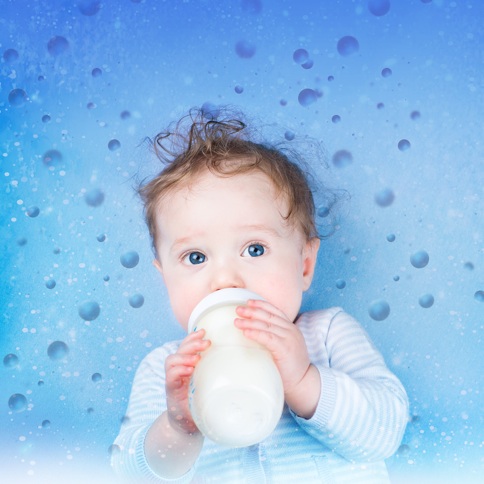Independent testing commissioned by Friends of the Earth US has found risky nanoparticles deemed unsafe for use in toothpaste in baby formula. Six samples of baby formula made by Gerber®, Enfamil®, Similac® and Well Beginnings™ – which are all available online in Australia – were tested. Four of the samples contained nanoparticles of hydroxyapatite, three in particularly risky needle like form.
The European Commission’s Scientific Committee on Consumer Safety (SCCS) concluded that the needle-like form of nano hydroxyapatite found in Gerber®, Well Beginnings™, and Enfamil® formulas – which is similar in shape to asbestos – is potentially toxic and should not be used in products such as toothpaste and mouthwash.
If it’s not safe for use in toothpaste, it’s certainly not safe in baby formula.
According to the scientists from Arizona State University who conducted the testing, three of the samples also likely contained nano titanium dioxide or silica. Animal studies of nano titanium dioxide show it can damage DNA, disrupt cell function, interfere with the immune system, cross the intestinal tract and cause organ damage.
The SCCS found evidence that nano silica can damage DNA and stated that no conclusion of safety can be made.
How have these materials made their way into baby formula with no testing and no labelling? How has FSANZ failed again to take the basic steps needed to ensure that new and risky ingredients aren’t added to our foods – especially baby food – without safety testing?
FSANZ is putting our children at risk
Babies are at greater risk of suffering health effects from exposure to toxic nanoparticles because of their more vulnerable physiology. Babies’ immune, central nervous, reproductive and digestive systems are still developing and exposure to toxicants can lead to irreversible damage. Nanoparticles are known to be more reactive, more likely to move through cells and tissue and to have greater bioavailability.
The highest level of oversight and precaution needs to apply to foods consumed by babies. In the case of nanoparticles, which don’t have a history of safe use in foods, even greater care needs to be taken.
The Food Regulation Ministerial Council’s policy for the regulation of infant formula, which guides FSANZ, requires pre-market assessment for:
“any substance proposed to be used in infant formula does not have a history of safe use…or is produced using a substantially different technique or technology.”
FSANZ cannot claim that these nanoparticles are safe. They have no scientific evidence to support such a claim. They cannot claim they didn’t know baby formula contains nanoparticles – they have consistently refused to undertake any testing or even surveys of business in order to determine the extent of nanoparticle use in food.
In 2015, Friends of the Earth commissioned independent testing of a variety of 14 processed foods, including many for children. Every one of the products was found to contain significant levels of nanoparticles of either silica or titanium dioxide. None had been subject to pre-market safety testing. Prior to that testing, FSANZ had claimed there were no foods containing nanoparticles for sale in Australia.
Following the testing, FSANZ claimed that the products were safe, stating that the nanoparticles were safe because the same materials at larger sizes are considered safe. That conclusion directly contradicts the best available science.
FSANZ did nothing before our testing and nothing after. The agency lied to the Australian public about the safety of these products and continued to prove it cannot be trusted to ensure the safety of our food.
Now it’s happening again. FSANZ has failed to detect what is clearly the widespread use of nanoparticles in baby formula.
This time FSANZ must act. Friends of the Earth is calling for an urgent recall of any baby formula containing nanoparticles until safety testing is undertaken.
Read our briefing on the test results.


